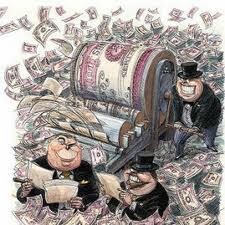REUTERS -- Many of the most profitable U.S. corporations paid little or no federal income tax from 2008 to 2012, according to a five-year study issued on Tuesday by a left-leaning tax activist group.
Citizens for Tax Justice looked at 288 profitable Fortune 500 companies and said that 26 of them -- including Boeing Co (NYS: BA - News), General Electric Co (NYS: GE - News) and Verizon Communications Inc (NYS: VZ - News) -- paid no federal income tax in the five-year period.
There's a lot of "he said, she said" after this in the rest of the article, as Corporations piously claim to pay taxes and paint CTJ as a bunch of commies with poor accounting skills. So I pulled up the chart of corporate profits before taxes (the blue line) and added corporate profits after taxes (the red line).
Here's the close up of the time frame in the article. As you can see, the red "after taxes" profit line is actually above the blue "before taxes" line most of the time since the "Too Big To Fail" bailouts of 2009. So corporations actually have more profit after "paying their taxes" than before, according to the Federal Reserve chart. Not only does CTJ have it right, it's actually worse than they said.
A lot worse. I've been pointing out for years that the Fed's QE program is not helping Main Street, it's helping Wall Street. One of my tools to prove this is comparing money creation by the Fed (excess reserves) to the stock market. Here's that chart:
I went to update that chart, and the Fed stopped providing that data in May of 2013. Then I ran across this Forbes article from May 22, 2013:
"During the Q and A following Chairman Bernanke’s testimony before the Joint Economic Committee today, Senator Sanders said he was preparing legislation to prohibit the payment of interest on excess reserves, and, indeed, to require banks to pay to hold excess reserves. The idea was to “unlock” the excess reserves held by the banking system and get them out in the economy through more vigorous bank lending. Despite over $2 trillion of assets being added to the Feds total assets, the equivalent amount of new reserves added to Fed liabilities remain, for the most part, excess reserves."
The fact the Fed discontinued a data series that had been running since 1959 the same week someone on Capital Hill noticed the TBTF banks are sitting there collecting interest on $2 Trillion they are supposed to be lending to Main Street is, I'm sure, coincidental.
Then again...here's how the Fed creates reserves through the QE program:
Creating Money through Open Market Operations. Unlike your bank, the Fed can create new bank reserves as well as money. The primary way the Fed does so is by buying and selling U.S. Treasury securities on the open market. For example:
- When the Fed buys $10 million of Treasury bills on the open market, it credits the selling banks' reserve accounts for $10 million.
- Since the reserves didn't come from another bank, one could say they were created out of “thin air.”
- The initial expansion of deposits and reserves will lead to an expansion of 10 times $10 million because each dollar of reserves will support roughly 10 times that amount in deposits.
Cool. Who are the primary dealers? This is the Current list of 21. They broker a commission on the T-bills. Then, they are paid interest on the money the Fed created to buy those certificates.
You'll see several Too-Big-To-Fail Banks on the list, notably JP Morgan. Notable because they are the largest proprietary trader in the world and recently changed their methodology for reporting trading profits and losses. Because they had the statistically impossible zero trading losses in 2013.
So...a Senator noticed the Fed's QE wasn't reaching Main Street, maybe because the TBTF Banks were being paid just to sit on it. The Fed promptly stopped providing the excess reserve information.
Problem solved.
JP Morgan, perhaps sensing some Senator might notice they never lose money trading and have mountains of excess reserves being used to rig markets instead of helping Main Street, masked that information.
Problem solved.
Today, Janet Yellen the new chairwoman of the Fed, announced the she's ready to print some more if need be. Stocks are at all time highs as a result. And as we all know by now after hearing it on CNBC daily for 5 years "Stocks rise because the economy is doing great!" Which is great for corporate profits, which makes the economy "greater" with all that tax revenue. I've got a hunch we won't be able to see that "Before and After" corporate tax information much longer.
Problem solved.
Ponzi on, Wayne.










